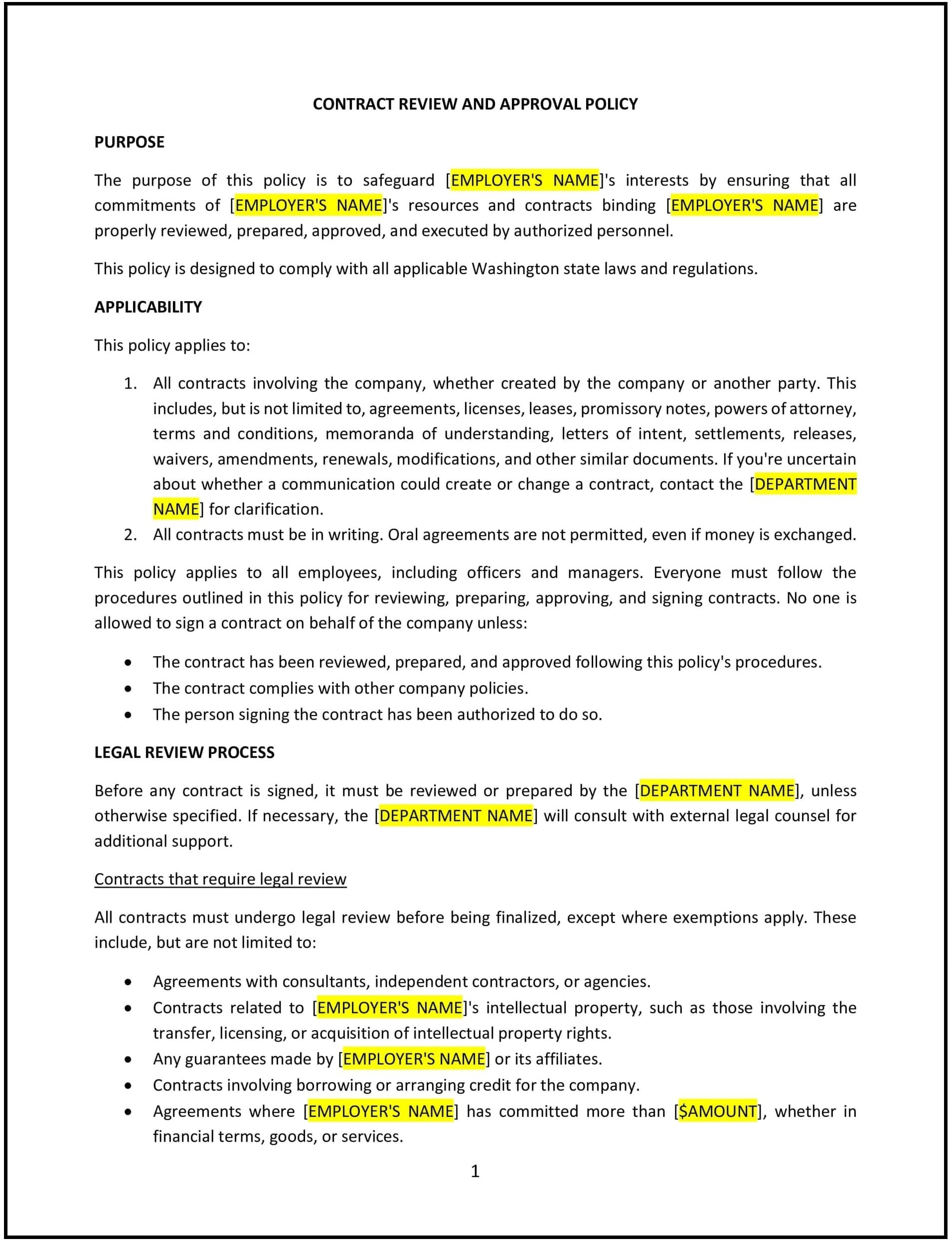Contract review and approval policy (Washington): Free template
Got contracts to review? While you're here for policies, let Cobrief make contract review effortless—start your free review now.

Customize this template for free
This contract review and approval policy is designed to help Washington businesses establish a standardized process for reviewing, approving, and executing contracts. The policy outlines the steps required to ensure that all contracts are reviewed for legal compliance, financial implications, and alignment with company objectives. It also specifies the roles and responsibilities of employees involved in the contract approval process and the procedures for obtaining necessary approvals before a contract is signed.
By adopting this policy, businesses can reduce the risk of entering into unfavorable contracts, enhance compliance with Washington state laws and federal regulations, and protect the company’s interests in contractual agreements.
How to use this contract review and approval policy (Washington)
- Define the scope of the policy: Clearly outline which types of contracts are covered by the policy, such as vendor agreements, employee contracts, licensing agreements, leases, and service contracts. Specify whether the policy applies to all contracts or only those above a certain value or complexity.
- Specify review steps: The policy should detail the steps involved in reviewing contracts, including legal, financial, and operational reviews. It should clarify the process for identifying risks, reviewing terms and conditions, and ensuring the contract aligns with company goals and legal requirements.
- Assign roles and responsibilities: Clearly define the roles of individuals or teams involved in the contract review and approval process. This may include legal counsel, financial officers, department heads, and senior executives. The policy should specify who is responsible for reviewing, approving, and executing contracts.
- Establish approval levels: Define the approval hierarchy for contracts, including the decision-makers who must approve contracts at various levels. This could include managers, directors, or the board of directors, depending on the value or significance of the contract.
- Address contract negotiation: The policy should outline how contract negotiations will be handled and who is authorized to negotiate on behalf of the company. It should specify whether negotiations can take place with vendors or if contracts require approval before negotiations begin.
- Set timelines for approval: The policy should establish timelines for reviewing and approving contracts to ensure timely execution. It should specify how long each step in the process should take and whether there are any deadlines for approving certain types of contracts.
- Ensure compliance with Washington and federal laws: The policy should ensure compliance with Washington state contract laws, federal regulations, and industry standards. This includes ensuring contracts meet the legal requirements for enforceability and protection of the company’s interests.
- Review and update regularly: Periodically review and update the policy to ensure it remains compliant with Washington state laws, federal regulations, and any changes in the company’s operations or contract management practices.
Benefits of using this contract review and approval policy (Washington)
This policy offers several benefits for Washington businesses:
- Reduces legal and financial risks: By establishing a clear process for reviewing and approving contracts, businesses can avoid entering into unfavorable or non-compliant agreements that may expose them to legal or financial risks.
- Promotes compliance with laws and regulations: The policy helps contracts comply with Washington state laws and federal regulations, reducing the risk of legal disputes and penalties.
- Promotes accountability: By assigning specific roles and responsibilities for contract review and approval, the policy promotes accountability at all levels of the organization, ensuring that contracts are thoroughly vetted and approved by the appropriate individuals.
- Increases efficiency: The policy streamlines the contract approval process, making it easier for employees to understand the steps involved and reducing delays in finalizing contracts.
- Enhances business relationships: By ensuring that contracts are carefully reviewed and negotiated, businesses can build stronger, more reliable relationships with vendors, clients, and partners.
- Protects the company’s interests: The policy helps ensure that contracts are favorable to the company and align with its goals, reducing the likelihood of disputes and protecting the company’s legal and financial interests.
Tips for using this contract review and approval policy (Washington)
- Communicate the policy clearly: Ensure that all employees involved in the contract process are familiar with the policy and understand their responsibilities. Include the policy in the employee handbook, review it during onboarding, and provide regular training on contract management practices.
- Streamline the approval process: To prevent delays, establish clear timelines for each step of the contract review and approval process. Ensure that all stakeholders understand the deadlines and that contracts are reviewed in a timely manner.
- Use contract management software: Consider using software to track contracts, streamline the review process, and maintain a record of approvals. This can help improve efficiency and ensure that no contracts are overlooked or delayed.
- Monitor contract compliance: After a contract is approved and executed, monitor its compliance to ensure that all terms and conditions are being met. Regularly review contracts to identify any potential issues or areas for renegotiation.
- Review and update regularly: Periodically review the policy to ensure it remains compliant with Washington state laws, federal regulations, and any changes in the company’s operations. Regular reviews will help ensure the policy stays relevant and effective.